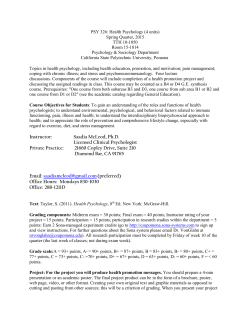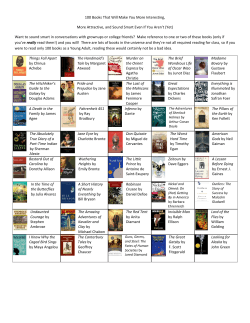
PDF - Ed Mendelowitz
Course Syllabus Course Title: Existential Psychology and Literature Instructor: Ed Mendelowitz, Ph.D. emendelowitz@saybrook.edu Hours by arrangement Catalog Course Description: Kafka, it is clear, read Freud. What might have happened had Freud read Kafka? What if psychology had inclined from the start—as William James, Otto Rank, and Rollo May had urged—toward literary and intuitive epistemologies and conceptions of the mind as it sketched out its apparent topography? Modernist European writers like Pirandello, Woolf, Kafka, Musil, Beckett, and Broch were native psychological geniuses who understood reflexively that existence and psychology could not be systematized— precisely why they opted for fiction, and oftentimes essays as well, as their preferred methodologies. “No longer joy in certainty but in uncertainty,” proclaimed the forwardlooking Nietzsche; “No longer ‘cause and effect’ but the continually creative.’” In this course, we shall consider selections from the work of some of these modernist masters and several others as well and, so, open up to the crossroads between literature, awareness, world and the mind. We will be considering, in effect, a gathering of “existential soundings” and thereby inquiring into that, arguably, that only the literary sensibility can say. Textbooks and Readings: Required Texts: Didion, J. 2007). The year of magical thinking. New York, NY: Vintage. Kafka, F. (1999). The blue octavo notebooks (E. Kaiser & E. Wilkins, trans.). Cambridge, UK: Exact Change. Kafka, F. (2007). The Stoker. In Kafka’s selected stories (S. Corngold, Ed. and trans.). New York, NY: Norton. Kundera, M. (1991). Immortality (P. Kussi, trans.). New York, NY: Grove Press. May, R. (1991). The cry for myth. New York, NY: Norton. 1 Musil, R. (1995). The man without qualities, Vol. I (S. Wilkins & B. Pike, trans.). New York, NY: Knopf. Pessoa, F. (2003). The book of disquiet (R. Zenith, trans.). New York, NY: Penguin Books. Smith, P. (2011). Woolgathering. New York, NY: New Directions. Wheelis, A. (1999). The listener. New York, NY: Norton. Required Articles: Mendelowitz, E. (1999). ‘Pirandello’s “Late Mattia Pascal”: Inconsistent Being and the Enigmatic Self.’ Paper presented at the Sixth European Congress of Psychology in Rome, Italy. Mendelowitz, E. (2009). Building the Great Wall of China: Postmodern reverie and the breakdown of meanings. In L. Hoffman, M. Yang, F. J. Kaklauskas, & A. Chan, Existential psychology East/West (pp. 327-350). Colorado Springs, CO: University of the Rockies Press. Mendelowitz, E. (2010, April). Science, psychology & the sea. Society for Humanistic Psychology. Newsletter. Retrieved at http://www.apadivisions.org/division32/publications/newsletters/humanistic/2010/04/humanitas.aspx 2
© Copyright 2025















